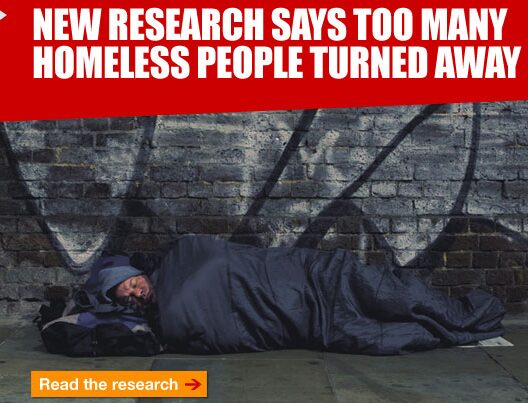 What if Jesus were a mystery shopper? You know… a person testing how customers are being treated. We already know the answer to that. “He came unto his own and his own knew him not”.
What if Jesus were a mystery shopper? You know… a person testing how customers are being treated. We already know the answer to that. “He came unto his own and his own knew him not”.
Crisis – the national charity for homeless hired 8 “mystery shoppers” of homeless services. Here are the results.
Key points
• Eight aspiring actors with previous experiences of homelessness mystery shopped 16 local authorities to examine the quality of advice and assistance they provide to single homeless people
• Each mystery shopper took the role of a particular character to explain why they needed help with their housing. These were based around one of four characters which were drawn from real life situations that may cause an individual to become homeless: someone who has been forced to sleep rough after losing their job, a young person who had been thrown out of the family home, a victim of domestic violence, and a very vulnerable person with learning difficulties
• In 37 out of the 87 visits, local authorities made arrangements to accommodate mystery shoppers that evening, either through the provision of emergency accommodation or because they had negotiated for them to return to their previous address
• In the remaining 50 visits, most of which were at London boroughs, they received inadequate or insufficient help. It was common for mystery shoppers to simply be signposted to written information about renting privately or even turned away without any help or the opportunity to speak to a Housing Adviser
• Elsewhere in England, and one borough in London, mystery shoppers always saw a Housing Adviser and were generally given time to discuss their circumstances. Staff were also more proactive in trying to find options for mystery shoppers and consistently demonstrated a greater degree of empathy
• In a significant number of visits (29) mystery shoppers did not receive an assessment and were not given the opportunity to make a homelessness application
• On a number of occasions, mystery shoppers – some of whom played very vulnerable characters – were denied any type of help until they could prove that they were homeless and eligible for assistance, whilst the local authorities in question made no effort to make inquiries themselves or provide temporary accommodation in the
interim
• A number of factors had a marked impact on mystery shoppers’ experiences of the visits: lack of privacy, interactions with , the office environment, and waiting times – all had a profound impact and often compounded feelings of anxiety, stigma and shame
• The regional disparity in the results suggests housing pressures in London are having a significant effect, and visible and hidden forms of homelessness have risen significantly in recent years. However, there were some examples of better performance in London suggesting that the culture, training and resources in Housing Options and homelessness services is also playing a role
• Homelessness is devastating and should not happen to anyone; a strong safety net to provide meaningful assistance is therefore crucial. This research has highlighted that too many homeless
people are turned away from help. The consequences of local authorities failing to intervene early can be devastating and trap people in homelessness for a far longer time – at great personal cost to the individual and huge expense to the public purse
Tags: Homelessness, UK

